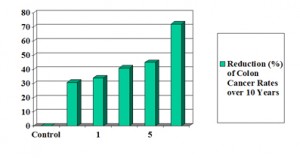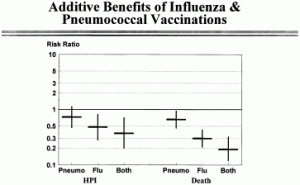The proverbial “ounce of prevention” can be very crucial when it comes to cancer screening methods. Cancer screening has been in the forefront for some time. Early disease detection is not only crucial for successful treatment; it can be a lifesaver!
Effective screening methods are available for some forms of cancer. Mammography screening for breast cancer and rectal examination and PSA tests for prostate cancer are methods that have received attention in the media.
Screening the large intestine for colon cancer by performing a colonoscopy has not made inroads, but new statistics point out the benefits. A colonoscopy will examine the colon for irregularities, namely the formation of polyps. Polyps are initially harmless and non-cancerous, however over time, some polyps have the potential to turn cancerous. In a colonoscopy examination, small polyps can be removed immediately, and this “weeding out” process is a highly effective preventative method against colon cancer. Research has shown, that one colonoscopy that is performed in a middle-aged patient (in his 50’s or 60’s) decreases the risk of developing colon cancer quite significantly. If no polyps are found in the initial screening, it is safe to assume that no colon cancer will present itself for 10 years.
Dr. Harminder Singh and associates from Cancer Care Manitoba and the University of Manitoba, in Winnipeg Manitoba/Canada, analyzed data of the Manitoba Health’s physicians’ database where 35,975 patients had undergone a colonoscopy, but were negative for colon cancer.These colonoscopies took place between April 1, 1989, and December 31, 2003 and follow-up was for 10 years. The end point was death or diagnosis of colon cancer.
| One Screening Colonoscopy Guarantees Low Colon Cancer Risk for 10 Years (modified JAMA. 2006; 295: p.2366-2373) |
 |
This retrospective study showed the following results depicted in the modified graph bar. Patients who were negative in the beginning of the study had a reduction of colon cancer rates of 72% at the 10-year point when compared to those who had no colonoscopy. This is quite an astounding finding. Even at the 5-year point there was a reduction of colon cancer risk by 45% from a single colonoscopy. This would indicate that a person should have a colonoscopy at about the age of 50 to establish freedom of colon cancer. This could be repeated only every 10 years to ensure that no colon polyps and colon cancer develop in the meantime. This should be definitely done in patients who have a family history where colon cancer occurred in a first relative such as mother, father, brother or sister, where specialists say screening should be done every 3 years. In this familial form of colon cancer they should also have a colonoscopy done earlier (at age 40 or earlier). However, this data would indicate that in everybody such colonoscopy screening would be beneficial as it is one of the most common cancers in men and women and other tests are not reliable at this time.
More information about colon cancer: http://nethealthbook.com/cancer-overview/colon-cancer/
Reference: JAMA. 2006;295: page 2366-2373
Last edited Nov. 1, 2014






